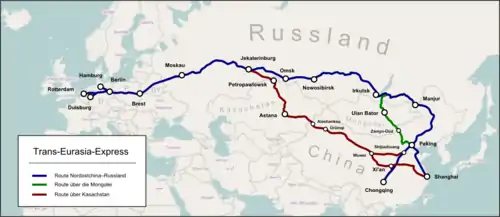Trans-Eurasia Logistics
Trans-Eurasia Logistics, AKA CHINA RAILWAY Express[1], was a joint venture between German rail company Deutsche Bahn and Russian RZhD, China Railway Corporation from China, Russian Railway Company, Russia operating container freight trains between Germany and China via Russia. The first such train arrived in Hamburg from Xiangtan on 6 October 2008, taking 17 days to make the trip.[2] Intermodal companies Polzug, Kombiverkehr, and TransContainer are also involved in the project.[3]

Container trains travel from China to Germany via the Trans-Mongolian and Trans-Siberian Railways, and then via Belarus and Poland - the route collectively known as the "Eurasian Land Bridge".[3] A break of gauge needs to be crossed when entering Mongolia from China (or Russia directly from China, if traveling via Manzhouli/Zabaykalsk), and then another one when leaving Belarus for Poland.
Trans-Eurasia Logistics operates the Yiwu - Madrid Railway line, which is the longest goods railway line in the world and connects China, Kazakhstan, Russia, Belarus, Poland, Germany, France and Spain. [4]
Locomotives Being Used
China
DongFeng DF4
DongFeng 4D
DongFeng 7C
HeXie 5: HXN5
HeXie 3B: HXN3B
Shaoshan 3B: SS3B (Diesel)
Shaoshan 3B: SS3B (Electricity)
HeXie 1: HXD1(Electricity)
HeXie 2: HXD2 (Electricity)
Mongolia
M62 (Diesel)
Kazakhstan
VL80 (Electricity)
KZ8A (Electricity)
Russia
VL80 (Electricity)
Europe
Belarus: BCG-1 (Electricity)
Poland & Germany: ES64F4 (Electricity)
Austria: ER20 (Diesel)
UK: Type 92 (Electricity)
See also
External links
References
- "國家發改委、中國鐵路總公司就中歐班列統一品牌啟用答問" (in Chinese). State Council Information Office. 8 June 2016. Retrieved 10 July 2017.
- DB Schenker, DB Schenker launches regular services to China after the festivities for the Chinese New Year (press release)
- Cargonews Asia, Rail reform picks up steam with foreign aid, 24 March 2008
- "China flags train to Madrid to revive Silk Route", Atul Aneja, The Hindu, 23 November 2014
